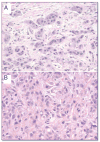Immortalizing the complexity of cancer metastasis: genetic features of lethal metastatic pancreatic cancer obtained from rapid autopsy
- PMID: 15846069
- PMCID: PMC2771924
- DOI: 10.4161/cbt.4.5.1663
Immortalizing the complexity of cancer metastasis: genetic features of lethal metastatic pancreatic cancer obtained from rapid autopsy
Abstract
The virtual lack of well-characterized metastatic pancreatic cancer tissues for study has limited systematic studies of the metastatic process of this deadly disease. To address this important issue, we have instituted a rapid autopsy protocol for the collection of high quality tissues from patients with metastatic pancreatic cancer, called the Gastrointestinal Cancer Rapid Medical Donation Program (GICRMDP). At the time of preparation of this manuscript, 20 patients with metastatic pancreatic cancer and one patient with metastatic colon cancer have undergone a rapid autopsy in association with the GICRMDP. The average time interval achieved for these 21 patients was 8.0 hours, with more than 500 individual samples of matched high quality primary and metastatic pancreatic cancer tissues, peritoneal/pleural fluid and blood obtained so far. For the first four patients in which the autopsy was performed in <6 hours, we have successfully xenografted the primary tumor and/or two to four independent matched metastases from a variety of target organ sites, with a take rate of almost 60% for the first 26 xenografted tumors attempted. In an initial survey of KRAS2, TP53 and DPC4 genetic status in lethal metastatic pancreatic cancers, activating KRAS2 mutations were detected in 82% of cases and inactivating TP53 mutations in 55% of cases, consistent with rates of genetic alteration of these genes in early stage pancreatic cancers. However, DPC4 inactivation was found in 75% of patients analyzed, suggesting that genetic inactivation of the DPC4 tumor suppressor gene continues to be selected for with growth at the primary site and metastatic spread to other organs. The invaluable tissue resources generated by the success of the GICRMDP will provide an unparalleled resource for study of metastatic pancreatic cancer and of the metastatic process in general.
Figures


References
-
- Jemal A, Tiwari RC, Murray T, Ghafoor A, Samuels A, Ward E, Feuer EJ, Thun M. J Cancer statistics, 2004. CA Cancer J Clin. 2004;54:8–29. - PubMed
-
- Sohn TA, Yeo CJ, Cameron JL, Koniaris L, Kaushal S, Abrams RA, Sauter PK, Coleman J, Hruban RH, Lillemoe KD. Resected adenocarcinoma of the pancreas-616 patients: Results, outcomes, and prognostic indicators. J Gastrointest Surg. 2000;4:567–79. - PubMed
-
- Rocha Lima CM, Green MR, Rotche R, Miller WH, Jr, Jeffrey GM, Cisar LA, Morganti A, Orlando N, Gruia G, Miller LL. Irinotecan plus gemcitabine results in no survival advantage compared with gemcitabine monotherapy in patients with locally advanced or metastatic pancreatic cancer despite increased tumor response rate. J Clin Oncol. 2004;22:3776–83. - PubMed
-
- Berlin JD, Catalano P, Thomas JP, Kugler JW, Haller DG, Benson AB. III Phase III study of gemcitabine in combination with fluorouracil versus gemcitabine alone in patients with advanced pancreatic carcinoma: Eastern Cooperative Oncology Group Trial E2297. J Clin Oncol. 2002;20:3270–5. - PubMed
-
- Rocha Lima CM, Centeno B. Update on pancreatic cancer. Curr Opin Oncol. 2002;14:424–30. - PubMed
Publication types
MeSH terms
Substances
Grants and funding
LinkOut - more resources
Full Text Sources
Medical
Research Materials
Miscellaneous
